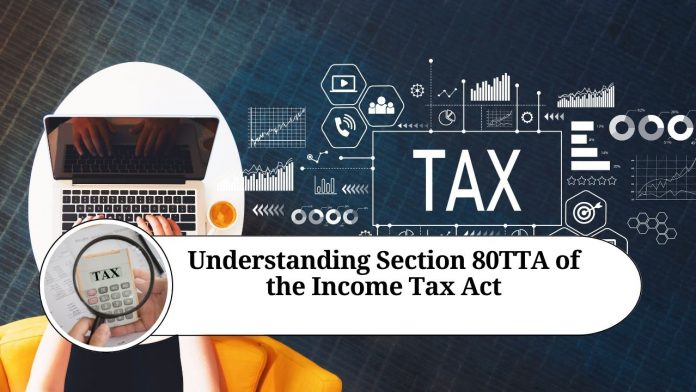Section 80TTA of the Income Tax Act is a provision that allows taxpayers to claim a deduction on interest income earned from their savings account. It was introduced by the Finance Act, 2012 and is applicable from the Assessment Year 2013-14 onwards. In this blog, we will discuss the provisions of Section 80TTA in detail.
What is Section 80TTA of the Income Tax Act?
Section 80TTA of the Income Tax Act provides a deduction of up to Rs.10,000 on interest earned from savings accounts. This deduction is available to individuals and Hindu Undivided Families (HUFs) and can be claimed by filing the Income Tax Return (ITR).
The deduction is available on interest earned from savings accounts held with banks, co-operative societies, and post offices. However, it does not include interest earned on time deposits or fixed deposits.
Conditions for claiming deduction under Section 80TTA
To claim the deduction under Section 80TTA, the following conditions must be fulfilled:
- The savings account must be held in an Indian bank, co-operative society, or post office.
- The interest earned from the savings account must be less than Rs.10,000 in a financial year.
- The taxpayer must file an Income Tax Return (ITR) to claim the deduction.
- The deduction is available only to individuals and HUFs.
- The deduction is not available on interest earned from fixed deposits or time deposits.
Benefits of Section 80TTA
Section 80TTA provides a deduction of up to Rs.10,000 on interest earned from savings accounts. This reduces the taxable income of the taxpayer, thereby reducing the tax liability. It is especially beneficial for individuals who have a low taxable income.
For example, if a taxpayer has earned interest of Rs.8,000 from their savings account in a financial year, they can claim a deduction of Rs.8,000 under Section 80TTA. This will reduce their taxable income by Rs.8,000 and result in a lower tax liability.
Conclusion
Section 80TTA of the Income Tax Act is a beneficial provision for taxpayers who earn interest from their savings accounts. It provides a deduction of up to Rs.10,000 on interest earned from savings accounts and reduces the taxable income of the taxpayer. However, it is important to ensure that the conditions for claiming the deduction are met and that the ITR is filed in a timely manner.
Read more useful content:
- section 234e of income tax act
- section 286 of income tax act
- section 90a of income tax act
- section 40a(7) of income tax act
- section 226(3) of income tax act
- section 24 of income tax act
Frequently Asked Questions (FAQs)
Q. What is Section 80TTA of the Income Tax Act?
Section 80TTA of the Income Tax Act provides a deduction of up to Rs. 10,000 on interest earned from savings accounts.
Q. Who can claim the deduction under Section 80TTA?
The deduction is available to individuals and Hindu Undivided Families (HUFs).
Q. Is the deduction available on interest earned from fixed deposits?
No, the deduction is not available on interest earned from fixed deposits or time deposits.
Q. What is the maximum amount of deduction that can be claimed under Section 80TTA?
The maximum amount of deduction that can be claimed under Section 80TTA is Rs. 10,000.
Q. Can the deduction be claimed on interest earned from savings accounts held with post offices?
Yes, the deduction can be claimed on interest earned from savings accounts held with post offices.
Q. What is the benefit of claiming deduction under Section 80TTA?
Claiming the deduction under Section 80TTA reduces the taxable income of the taxpayer, thereby reducing the tax liability.
Q. Is it necessary to file the Income Tax Return (ITR) to claim the deduction under Section 80TTA?
Yes, it is necessary to file the ITR to claim the deduction under Section 80TTA.
Q. Can an individual claim deduction under Section 80TTA if they have multiple savings accounts?
Yes, an individual can claim deduction under Section 80TTA for interest earned from multiple savings accounts, provided the total interest earned does not exceed Rs. 10,000 in a financial year.
Q. Is there any age limit for claiming the deduction under Section 80TTA?
No, there is no age limit for claiming the deduction under Section 80TTA.
Q. Is the deduction under Section 80TTA available for non-residents?
No, the deduction under Section 80TTA is not available for non-residents. It is applicable only for residents of India.




















